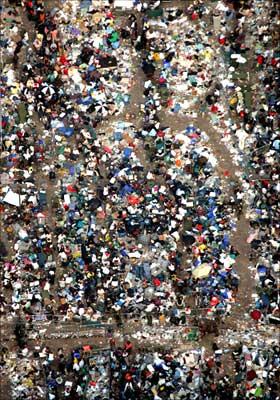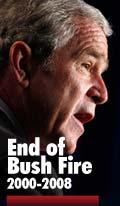
To be fair, not all of US President George Bush's woes were entirely of his making, says Matthew Schneeberger, in his series summing up the Bush presidency
The world has suffered United States President George W Bush's wars and rhetoric for eight long years.
Americans feel their pain.
Because, for every foreign policy blunder Bush made, there was an equally disastrous slip-up on the domestic front: crisis mismanagement, economic turmoil, decreased value of the US dollar, increased income disparity between rich and poor, hyper-partisan governance and so on.
It should be said that throughout his first four years in office, Bush remained relatively popular with the people, propped up by post-9/11 patriotic fervour. And though his electoral vote margin was still razor thin, his 2004 re-election was actually more decisive than his 2000 victory over Al Gore. Yet today his approval rating hovers below 30 per cent (after bottoming out at 19 pc in fall 2008), and a full quarter of Americans believe him to be the worst US president of all time.
So what went wrong?
To pinpoint the exact moment when Bush's relationship with the public truly soured, look no further than August 29, 2005.
That's when Hurricane Katrina, one of the most powerful hurricanes on record in the US, slammed into the Gulf of Mexico Coastline, flooding New Orleans and forcing its citizens to evacuate. As the situation deteriorated in the days that followed, the city experienced a complete breakdown of law and order; the tragic hopelessness of the situation was broadcast worldwide through photographs and videos.
The numbers aren't exact, but it's suspected that over 2,000 people lost their lives in the tragedy (there are 1,836 confirmed deaths with over 700 people still missing). An alarming majority of the victims were impoverished African Americans, leading to charges of racism against both state and federal officials.
Nationwide, outcry over the Federal Emergency Management Agency's slow and bungled response saw the president's approval ratings slip below 40 pc for the first time.
Matthew Dowd, Bush's chief strategist for the 2004 presidential campaign, has said: "Katrina to me was the tipping point. The president broke his bond with the public. Once that bond was broken, he no longer had the capacity to talk to the American public. State of the Union addresses? It didn't matter. Legislative initiatives? It didn't matter. Public relations? It didn't matter."
Bush's 'contract' with the people had effectively ended.
From that point onward, it's been an inglorious fall to Earth for the president. Resounding Democratic wins in the 2006 and 2008 elections are attributed to him.
 Though he has long been despised by the Left, Bush has come to be disliked by many of his original supporters: the far Right. For advocating intervention and bail-outs throughout the last few months, Rush Limbaugh and his ilk have (in disgust) called the president a 'liberal' and a 'socialist'.
Though he has long been despised by the Left, Bush has come to be disliked by many of his original supporters: the far Right. For advocating intervention and bail-outs throughout the last few months, Rush Limbaugh and his ilk have (in disgust) called the president a 'liberal' and a 'socialist'.
In his final press conference, Bush tried to justify these actions: "I readily concede I chunked aside some of my free market principles when I was told by chief economic advisors that the situation we were facing could be worse than the Great Depression."
In March 2008, Republican US House representative Thomas Davis III said: "It's no mystery. You have a very unhappy electorate, which is no surprise, with oil at $108 a barrel, stocks down a few thousand points, a war in Iraq with no end in sight and a president who is still very, very unpopular. He's just killed the Republican brand."
On the other hand, perhaps history will be kinder to Bush than his contemporaries. After all, it easily can be said that Bush was a victim of circumstance: first 9/11, then Katrina, finally the economic collapse.
Plus -- and Bush-bashers tend to forget this -- while 'the 'Clinton years' were great for Americans, the so-called 'Dot Com' bubble in the stock market burst long before Bush assumed office, and thus should not unfairly be weighed against him. Many of the bad decisions to strip away regulation from Wall Street and to encourage risky lending practices -- the best example being the millions of so-called sub-prime mortgages -- were made before he arrived. After the roaring '90s, most economists feel that a cooling of the US economy was unavoidable.
But, in reality, Bush did nothing to prevent the economic calamity, instead goading it onward with irresponsible tax cuts and reckless treatment of the US dollar. His guiding principle remained an absolute commitment to the 'powers of the market', and he worked for corporate tax-cuts and less government regulation every step of the way. At one point, the president even tried -- unsuccessfully -- to tie social security benefits to the stock market. Had he managed it, in September and October a staggering number of Americans would have seen their retirement provisions completely wiped out.
Still, despite the frantic cash injections of the past few months, the situation is bleak: More jobs were lost during 2008 -- around 2.6 million -- than in any year since 1945. The federal budget deficit is at an all-time high, at over $10 trillion. Since maxing out in 2007, the Dow Jones Industrial Average and NASDAQ have seen almost unprecedented collapses, over 40 pc and 60 pc respectively.
On the home front, if the situation Bush inherited wasn't exactly dreamy, the one he's left incoming US President Barack Obama is nothing less than a nightmare.
Image: An aerial view of Hurricane Katrina evacuees waiting to be moved from outside the Louisiana superdrome in New Orleans in September 2005. Photograph: David J Philip/Reuters
Matthew Schneeberger is an American reporter working at rediff.com's editorial headquarters in Mumbai
Earlier in the series:
Inauspicious beginning, inglorious end
After 9/11, Bush suddenly had political capital
Alas, 9/11 led to Bush's cowboy foreign policy






 © 2025
© 2025